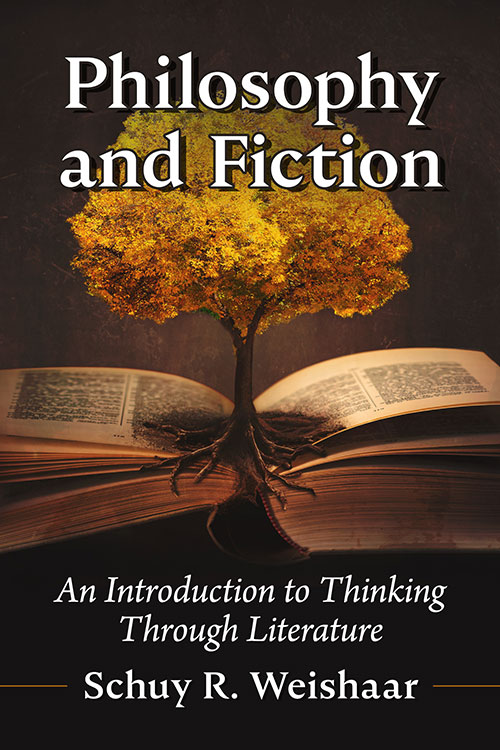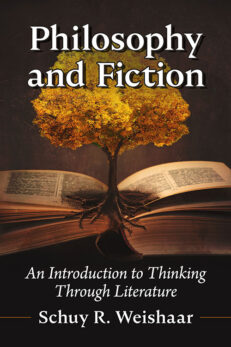Philosophy and Fiction
An Introduction to Thinking Through Literature
$39.95
In stock
About the Book
Fiction lies in order to tell the truth and seeks reality through shadows. Philosophy attempts to dispel false realities; it pursues clear understanding of things as they are. While the relation of philosophy and fiction is, perhaps, paradoxical, they implicate one another’s picture of human experience. This book uses fiction to help readers process philosophical themes, and the philosophical reflection, in turn, helps clarify the fiction. The study moves through roughly a hundred years of modern fiction, from Washington Irving’s “The Devil and Tom Walker” (1824) through James M. Cain’s Double Indemnity (1936).
Several “classic” works of literary fiction are examined, a few largely forgotten stories and several popular novels. Reading fiction through the lens of philosophy helps readers perceive the complexity and richness of fiction, reinvigorating the pursuit of wisdom that lies just beneath the surface of the words on the page.
About the Author(s)
Bibliographic Details
Schuy R. Weishaar
Format: softcover (6 x 9)
Pages: 190
Bibliographic Info: bibliography, index
Copyright Date: 2023
pISBN: 978-1-4766-8847-3
eISBN: 978-1-4766-4844-6
Imprint: McFarland
Table of Contents
Acknowledgments vii
Preface 1
Reading and Writing about Literature 1
Introduction 5
“Philosophy and Fiction” and “Thinking through Literature” 5
Modern Fiction 7
Why Philosophy? 9
Themes and Chapters 11
Chapter One. Nature 13
Introduction 13
“Travelling during thunderstorms”: “The Lightning-Rod Man” (1854) by Herman Melville 16
“An animal that has a bad reputation”: “How I Killed a Bear” (1878) by Charles Dudley Warner 22
“The undying life of the world”: “The Storm” (1898) by Kate Chopin 29
“A glitter in his eyes which I had often seen in the eyes of wild beasts”: “The Leopard Man’s Story” (1903) by Jack London 35
“The bitterest conclusion”: “The White Silence” (1899) by Jack London 40
Conclusions 45
Chapter Two. Metaphysics 48
Introduction 48
“The facts … stand on an altogether different footing”: “The Remarkable Case of Davidson’s Eyes” (1895) by H.G. Wells 52
“Oh, I go by various names”: “The Devil and Tom Walker” (1824) by Washington Irving and “Young Goodman Brown” (1835) by Nathaniel Hawthorne 56
“Who art thou?” “The Selfish Giant” (1888) by Oscar Wilde 63
“What you mistake for madness”: “The Tell-Tale Heart” (1843) by Edgar Allan Poe 67
Conclusions 72
Chapter Three. Time 76
The Time Machine (1895) by H.G. Wells: “I shall controvert one or two ideas….” 76
“Social triumphs”: Politics, Time, and the Limits of Subjectivity 79
“An altogether new relationship”: Class, Species, and Survival 82
Conclusions: Status, the Future, and the Irony of Social
Darwinism 84
Chapter Four. Social Cont(r)acts 86
Introduction 86
“Father, father, don’t kill me!” “Mateo Falcone” (1829) by Prosper Mérimée 89
“My father is still a giant”: “The Judgement” (1913) by Franz Kafka 95
“The evil consequences of pernicious neglect”: “Nobody’s Story” (1853) by Charles Dickens and “The Happy Prince” (1888) by Oscar Wilde 102
“I must not only punish, but punish with impunity”: “The Cask of Amontillado” (1846) by Edgar Allan Poe 111
Conclusions 117
Chapter Five. The Life of the Mind 120
Introduction 120
“Not born for ordinary life”: “Looking Back” (1900) by Guy de Maupassant 125
“Just look at you”: “A Hunger Artist” (1922) by Franz Kafka 129
“To Touch the Heart of God”: “The Tables of the Law” (1897) by W.B. Yeats 137
“You perceive?” “Pink Flannel” (1919) by Ford Madox Ford and “The Mark on the Wall” (1921) by Virginia Woolf 145
Conclusions 153
Chapter Six. Love and Death 156
Loving Death: Double Indemnity (1936) by James M. Cain 156
Fraud, Murder, and Intrigue 157
A Grim Courtship 158
The Femme Fatale into Monstrous Feminine 159
The Serpent in the Self 161
Psychos and Psychoanalysis 163
More Than Just Business 165
Death-Drive: The End 169
Chapter Seven. The Ends of Fiction and Philosophy 170
Morality, Madness, and (Un)freedom 170
Slippery Subjects 171
Works Cited 175
Index 179
Book Reviews & Awards
• “…reaches well beyond literature and philosophy and delves into the human tendency to reduce writings to preset, cultural categories, while providing a way beyond—to read and think beyond what may appear to be known or knowable.”—William Daniel, author of Inhabited by Grace and Christ the Liturgy
• “I loved reading this book. I found it interesting, engaging, and illuminating!”—Emily Dial-Driver, professor of English





